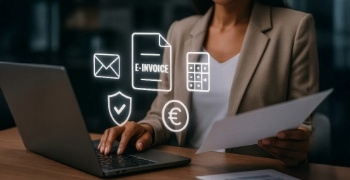
Update on e-invoicing in Germany
Germany has recently published new information about its e-invoicing requirements. Read on for details.
B2G
E-invoicing has been obligatory in Germany for business-to-government (B2G) transactions since November 2020. This requirement applies to all invoices submitted to federal authorities, and similar requirements have been gradually implemented for each state (16 states in the Federal Republic of Germany) and municipal authorities.
B2B
Following the last election, Germany’s ‘traffic light’ coalition government added obligatory use of e-invoicing in business-to-business (B2B) transactions to its agenda as part of the Growth Opportunities Act.
In its October 2024 letter, ‘Ausstellung von Rechnungen nach § 14 UStG; Einführung der obligatorischen elektronischen Rechnung bei Umsätzen zwischen inländischen Unternehmern ab dem 1. January 2025’ (‘Issue of invoices in accordance with Section 14 Value Added Tax Act; Introduction of mandatory electronic invoicing for transactions between domestic businesses from 1 January 2025’), Germany’s Federal Ministry of Finance (Bundesministerium der Finanzen, BMF) set the requirements and further clarified terms for the upcoming B2B e-invoicing mandate.
Soft approach with transition periods
According to the BMF’s published plans, the introduction of e-invoicing in Germany will take a ‘soft’ approach, providing transition periods and flexibility for companies. This approach is not a surprise — given Germany’s economic structure is dominated by SMEs for whom a strict e-invoicing mandate and forced start might be a challenge — as well the fact that many companies in the country have been establishing e-invoice exchange with business partners on a voluntary basis over many years and might already have an existing e-invoicing solution in place.
The e-invoicing mandate for B2B will be rolled out in several stages and will distinguish between the obligation to receive e-invoices and the obligation to issue e-invoices, with the former obligation starting as soon as January 2025
Clear definition of e-invoice as of January 1, 2025
The BMF’s document specifies the term ‘e-invoice’: As of January 1, 2025, an e-invoice will be specified as “an invoice that is issued, transmitted and received in a structured electronic format and enables electronic processing” — such as XRechnung. Standard PDFs created, transmitted, and received electronically will not be considered e-invoices after January 1, 2025 (although they are under current legislation).
The requirement for ‘invoice readability’ will now strictly mean that the XML file must be machine-readable. As such, also creating a human-readable document is not required and providing one (e.g., through a hybrid format or additional PDF) is only optional.
‘Hybrid’ e-invoices, such as ZUGFeRD, that rely on the PDF/A-3 format and combine structured data with the visual representation will also be considered e-invoices, and the focus now clearly lies on machine readability. In the (unlikely) case that there is a difference between the XML data contained in the PDF/A-3 file (the machine-readable data) and the PDF visualisation (the human-readable data), the XML data will be considered the invoice data. This is a significant change from the current rules, where the visual part of the ZUGFeRD invoice prevails and is considered the ‘valid’ invoice data if it differs from the XML-based information.
All other digital invoice formats, such as standard PDF, JPEG, email with invoice information, will be considered ‘other invoices’ (together with paper invoices).
As there is a transition period for the obligation to issue e-invoices, from January 1, 2025 until 31 December 31, 2027, two groups of invoices can be compliantly used for billing during this transition period:
- E-invoices:
- Structured data format complying to the EN 16931 standard.
- Other structured formats agreed between the trading parties as long as this format enables the correct and complete extraction of the information required under the Value Added Tax Act (Umsatzsteuergesetz, UStG) into a format that complies (or is interoperable) with the norm EN 16931.
- Other invoices:
- Paper, simple PDF created via the printing function, JPEG, scanned formats, email with invoice information, etc.
Note: Moving standard PDFs to the ‘other invoices’ group is a significant change. In the past, German legislation considered standard PDFs created, transmitted, and received electronically as electronic invoices.
Who will be affected?
B2B transactions between domestic businesses — where both the supplier and the recipient are established in Germany (meaning they have their registered offices, management, a permanent establishment under VAT law, or residence in Germany). Cross-border transactions are exempt.
Exemptions
Exempt from the upcoming B2B e-invoicing mandate are:
- Transactions exempt from VAT
- Invoices with a total amount not exceeding €250.
- Tickets for passenger transportation
- Non-domestic transactions where at least one party is not a domestic company
Timeline
Until December 31, 2024: E-invoices can be exchanged voluntarily
E-invoices in structured formats can be issued with the recipient’s consent — alongside paper invoices, PDF documents, or emails with invoice details. Issuing and receiving e-invoices is possible on a voluntary basis — but not required. The ZUGFeRD format was established as a de facto standard in Germany; however, other formats are possible, as long as the trading parties agree on them and the e-invoices fulfil the UStG requirements for mandatory information and also meet the requirements for data authenticity, integrity, and readability.
January 1, 2025: Readiness to receive e-invoices required by all companies
- All businesses must be ready to receive e-invoices.
- There is no transition period for this part of the mandate.
- The invoice recipient cannot refuse an e-invoice and request to receive another type of invoice from the vendor (the invoice issuer decides what type of invoice to send, an ‘e-invoice’ or ‘other invoice’).
- The trading parties can agree on the format, as long as it is structured data compliant to EN 16931 or interoperable with it.
- The data must be transmitted electronically. This sounds logical, but it was important to exclude the (unlikely but theoretically possible) option of storing XML data on a USB stick for example and transferring it physically.
Note: The readiness to receive e-invoices is already achieved when the recipient provides an email address and receives the XML-based e-invoice as an attachment. We do not recommend it, as the recipient would miss the best efficiency benefit — the automated and machine-based invoice processing — but in theory, such a system would fulfil the legislative requirement.
January 1, 2027: Readiness to issue e-invoices required for large companies
- The obligation to issue e-invoices starts for companies that had a turnover above €800K in the previous year (2026).
- Smaller companies with a turnover below €800K in 2026 can still issue ‘other invoices’ (e.g., standard PDF, paper, JPEG).
January 1, 2028: Readiness to issue e-invoices required for all companies
- Even smaller companies with an annual turnover below €800K in the previous year must start issuing e-invoices for their customers.
- Only e-invoices as structured data will be compliant.
- ‘Other invoices’ will not fulfil the requirements of tax authorities for compliance.
- Starting from this date, it will no longer be possible to leverage existing EDI connections if the format is not compatible with the norm EN 16931.
E-reporting expected later
Germany is deploying e-invoicing in phases and at the initial stage, no clearance model or other type of transaction-based reporting is planned.
However, it is expected that some type of e-reporting (probably in real time) will be required at a later stage. The letter issued by BMF clearly states on page 2: “Closely linked to the introduction of mandatory electronic invoicing for domestic B2B transactions is the legal obligation, to be introduced at a later date, for the timely and transaction-related electronic reporting of certain invoice details to the administration (reporting system).”
As the e-invoicing mandate in Germany transitions into reality, businesses must act promptly and choose an appropriate e-invoicing provider. Early preparation is crucial, especially considering the government’s future plans to introduce e-reporting. Companies should opt for a provider capable of adapting to these evolving requirements seamlessly.
Avalara E-Invoicing and Live Reporting offers a robust platform that enhances efficiency and ensures compliance with both e-invoicing and live reporting mandates globally. With extensive expertise in tax, technology, and e-invoicing, Avalara supports enterprises and mid-sized companies in executing secure and compliant transactions. Contact us to discover how our universal solution can address your e-invoicing needs in Germany and beyond.

Avalara Tax Changes 2026 is here
The 10th edition of our annual report engagingly breaks down key policies related to sales tax, tariffs, and VAT.
Stay up to date
Sign up for our free newsletter and stay up to date with the latest tax news.



